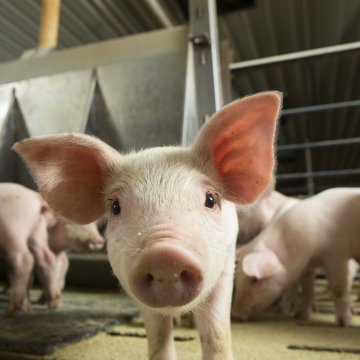The National Pork Producers Council (NPPC) applauded the U.S. and Indian government’s announcement...
From Barn to Operating Room - A Pig’s Role in Human Health

Great strides have been made to encourage consumers to include pork as a part of a heart-healthy diet. There is good reason for that encouragement. According to the National Pork Board’s website, pork.org, besides being darn tasty, pork is also nutritious. Naturally low in sodium and a good source of potassium, pork provides a good combination that regulates blood pressure.
Pork tenderloin and pork sirloin roast meet criteria to receive a Heart Checkmark from the American Heart Association by containing less than 5 grams of fat, 2 grams or less of saturated fat, and 480 milligrams or less of sodium per label serving.
That’s not to mention the protein packed into a 3-ounce serving of pork loin, pork sirloin and pork tenderloin — 24 grams, 24 grams and 22 grams, respectively.
As you can see, pork does a body good. And that’s just what we consume. Your basic run-of-the-mill hog has long been the producer of many things that enhance our lives, including pharmaceutical and industrial products. Researchers have discovered and perfected ways to use, as they say, “everything but the oink.”
According to porkcheckoff.org, nearly 20 drugs and pharmaceuticals can be traced to a porcine origin, from cortisone to heparin to relaxin.
Now, there’s potential that hogs may not only add to a heart-healthy diet, but they may also be able to actually provide the heart.
Heart of the matter
Early in January, as a last-ditch effort to save a man’s life, doctors at the University of Maryland Medical Center transplanted a pig’s heart into David Bennett, a 57-year-old man who was ineligible for a human heart transplant.
Xenotransplantation is the term for transplanting living cells, tissues or organs from one species to another, and the practice has been on the horizon for quite some time.
According to an article on nationalhogfarmer.com, xenotransplantation was first tried in the 1980s, with the most famous case of a baboon heart being transplanted into an infant girl. Baby Fae, as she became known, died within a month of receiving the heart because of her immune system’s rejection of the heart. For many years, though, heart valves from pigs have been used with success in replacing faulty human heart valves.
The pig that provided the heart for Bennett had been genetically altered to remove a sugar in its cells that is responsible for organ rejection.
According to various media reports, the U.S. Food and Drug Administration granted emergency authorization for the surgery on New Year’s Eve through its expanded access (compassionate use) provision.
This provision is granted when an experimental medical product, in this case the genetically modified pig’s heart, is the only option available for a patient. The authorization to proceed was granted in the hope of saving the patient’s life.
Promising development
As of this writing, the heart is keeping Bennett alive. Obviously, it’s too early to tell the long-term health effects for this man, but the hope lies in the potential that such medical advancements may provide.
As mentioned, Bennett’s existing health issues rendered him ineligible to receive a traditional heart transplant or a heart pump. But there are many more patients on the heart transplant waiting list, people who may fall victim to the numbers and the waiting game.
According to the federal government’s organ donor website, more than 100,000 people are on the national transplant waiting list. In addition to hearts, this number also includes those awaiting kidney, liver and lung transplants.
Although last year showed a record number of transplants with more than 40,000, there is still a large discrepancy between the supply and the demand.
It’s still too early to tell if this pig heart transplant will save Bennett’s life, but it does provide a ray of hope for someone waiting on a transplant list. Successful or not, xenotransplantation will be under the public microscope, but that is a discussion for another day.
In the meantime, I hope that this pig’s heart will give this man a much longer, fulfilling life, but even if it doesn’t, his “last choice” has helped advance the potential for future life-saving transplants.
EDITOR’S TAKE:
It is amazing to contemplate the developments in medical science that include transplanting the heart of a pig into a human. Sure, there are aspects of this that make us shudder just a bit, but the potential to save even more human lives in the future brings us joy. Should this development prove promising, one can only imagine what that would do for the pork industry and pork producers around the country. We’ll keep our eyes open for additional information related to this latest development. It could open worlds of opportunities in ways not imagined until now.








